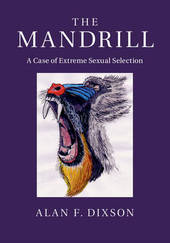
|
The Mandrill: A Case of Extreme Sexual Selection
Hardback
Main Details
| Title |
The Mandrill: A Case of Extreme Sexual Selection
|
| Authors and Contributors |
By (author) Alan F. Dixson
|
| Physical Properties |
| Format:Hardback | | Pages:273 | | Dimensions(mm): Height 253,Width 177 |
|
| Category/Genre | Primates |
|---|
| ISBN/Barcode |
9781107114616
|
| Classifications | Dewey:599.86 |
|---|
| Audience | | Professional & Vocational | |
|---|
| Illustrations |
15 Tables, black and white; 24 Plates, color; 56 Halftones, unspecified; 56 Halftones, black and white; 68 Line drawings, black and white
|
|
Publishing Details |
| Publisher |
Cambridge University Press
|
| Imprint |
Cambridge University Press
|
| Publication Date |
12 November 2015 |
| Publication Country |
United Kingdom
|
Description
Living in the remote forests of western central Africa, the mandrill (Mandrillus sphinx) is notoriously elusive and has evaded scientific scrutiny for decades. Yet, it is the largest and most sexually dimorphic of all the Old World monkeys, and perhaps the most colourful of all the mammals. Synthesising the results of more than twenty-five years of research, this is the first extensive treatment of the mandrill's reproductive and behavioural biology. Dixson explores in detail the role that sexual selection has played in shaping the mandrill's evolution, covering mechanisms of mate choice, intra-sexual competition, sperm competition and cryptic female choice. Bringing to life, through detailed descriptions and rich illustrations, the mandrill's communicatory biology and the functions of its brightly coloured adornments, this book sheds new light on the evolutionary biology of this fascinating primate.
Author Biography
Alan F. Dixson is a Professor in the School of Biological Sciences at Victoria University of Wellington, New Zealand. He is a world authority on the reproductive biology and evolution of sexuality in primates. During a distinguished career, he has held posts at the Zoological Society of London, the Medical Research Council (UK), the International Medical Research Centre in Gabon, the Sub-Department of Animal Behaviour, University of Cambridge, and the Zoological Society of San Diego.
Reviews'This excellent and well-researched book offers new insights for students and experts alike, and is sure to overturn common assumptions about this enigmatic primate. It is an impressive contribution and essential reading for anyone interested in animal behavior and primatology.' Charles Nunn, Duke University, North Carolina 'Alan F. Dixson pulls back the curtain on the secretive lives of the world's most florid primate and in the process teaches us all some important lessons about sexual selection. This volume further solidifies his rank among the giants of primatology.' Paul Vasey, University of Lethbridge 'This compelling account of mandrill biology provides fascinating insights into the evolution of extreme sexual dimorphism, carefully framed within the context of current sexual selection theory and the author's extensive knowledge of comparative primatology. Written in a clear and accessible style, the book combines thorough investigation of diverse topics, from natural history, evolution, ecology, behaviour and conservation, to anatomy, physiology and development.' Paula Stockley, University of Liverpool 'The Mandrill: A Case of Extreme Sexual Selection is a fascinating and exhaustive examination of the comparative biology and natural history of mandrills as well as the Mandrillus genus as a whole. Rich with detail and a pleasure to read, the book is comprehensive and synthetic in its approach, covering virtually every aspect of the biology of this species that has been studied to date. Unprecedented in its wealth of detail, The Mandrill is an essential addition to any primate library.' Larissa Swedell, City University of New York 'This book will be vital reading for anyone planning to work on mandrills or drills. Not only does it bring together a wealth of information in a single volume, but it also suggests many areas that would be worthy of further study - both in Mandrillus and in other species.' Caroline Ross, Folia Primatologica
|